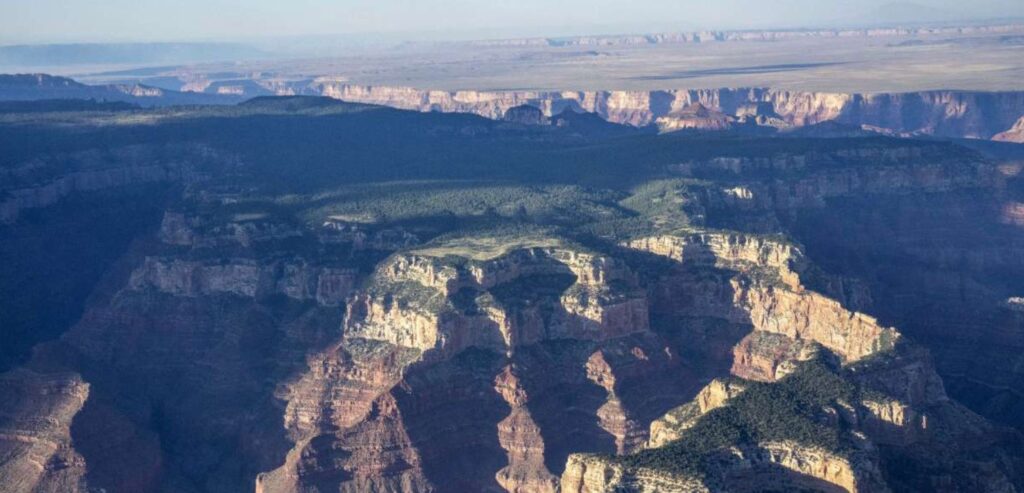President Biden signs proclamation to create Baaj Nwaavjo I’tah Kukveni National Monument
President Joe Biden announced on Tuesday the establishment of a new national monument near the Grand Canyon, named Baaj Nwaavjo I’tah Kukveni, which means “where Indigenous peoples roam” and “our ancestral footprints” in the Havasupai and Hopi languages respectively. The new monument covers nearly one million acres of public land surrounding the Grand Canyon National Park, and aims to protect the cultural, historical, and spiritual significance of the area for multiple Native American tribes. The proclamation also bans new uranium mining claims in the region, which had been restricted since 2012 but only for 20 years.

Biden signed the proclamation during his tour of the Western U.S., which will include Utah on Thursday. He said that the new monument is good “not only for Arizona but for the planet” and that it honors the “sacred connection” between the tribes and the land. He was joined by tribal leaders, Arizona Gov. Doug Ducey, and Interior Secretary Deb Haaland, who is the first Native American to lead the department.
Utah leaders condemn Biden’s decision as federal overreach and detrimental to local interests
The announcement of the new monument was met with swift criticism from Utah leaders, who accused Biden of misusing his authority under the Antiquities Act of 1906, which gives presidents the power to create national monuments from existing federal lands. Utah Gov. Spencer Cox, Sens. Mitt Romney and Mike Lee, and several cities and counties in southern Utah all expressed their opposition to the designation, saying that it will negatively impact the local residents, ranchers, miners, and industries that rely on the public lands on the Arizona Strip.
Cox said in a statement that “massive, landscape-scale monuments like this are a mistake” and that they “increase visitation without providing any additional resources for law enforcement and infrastructure to protect sensitive areas.” He also said that the monument will restrict access to critical minerals like uranium, which are key to cell phones, satellites, U.S. defense systems, and other American industries. He argued that the only right way to create large new land designations is through Congress in coordination with local leaders and residents.
Romney and Lee also raised concerns about the loss of domestic uranium sources, which they said will increase U.S. dependence on Russia and China and decrease energy efficiency. They said that the new monument will harm ranchers in southern Utah who graze their cattle on the public lands on the Arizona Strip. They called the proclamation “disappointing” and “a mistake” respectively.
The opposition from Utah officials is reminiscent of a similar battle over the Bears Ears and Grand Staircase-Escalante national monuments in Utah, which were created by former Presidents Barack Obama and Bill Clinton and later reduced by former President Donald Trump. Biden has ordered a review of those reductions and is expected to restore or expand them.
Native American tribes and environmentalists celebrate the new monument as a victory for conservation and justice
The creation of the new monument was welcomed by Native American tribes and environmentalists who have been advocating for decades to safeguard the areas surrounding the Grand Canyon National Park from mining, logging, development, and other threats. The Grand Canyon Tribal Coalition, which drafted a proposal for the monument in 2015, said that the designation will protect sites that are culturally, historically, and spiritually significant to 11 tribes that have ancestral ties to the region. The coalition includes representatives from the Havasupai Tribe, Hopi Tribe, Hualapai Tribe, Kaibab Band of Paiute Indians, Navajo Nation, Pueblo of Zuni, San Carlos Apache Tribe, San Juan Southern Paiute Tribe, White Mountain Apache Tribe, Yavapai-Apache Nation, and Yavapai-Prescott Indian Tribe.
The coalition said in a statement that they are “overjoyed” by Biden’s decision and that they are “grateful for his recognition of our ancestral homelands.” They also thanked Haaland for her support and leadership in advancing their proposal. They said that the new monument will ensure that their future generations can continue to access and practice their traditional ceremonies, songs, stories, prayers, and medicines on their sacred lands.
Environmental groups also praised Biden’s action as a major step for conservation and climate action. They said that the new monument will protect biodiversity, wildlife habitat, water quality, air quality, scenic beauty, and recreational opportunities in one of the most iconic landscapes in America. They also applauded the ban on new uranium mining claims as a way to prevent radioactive contamination and environmental degradation in the region.







